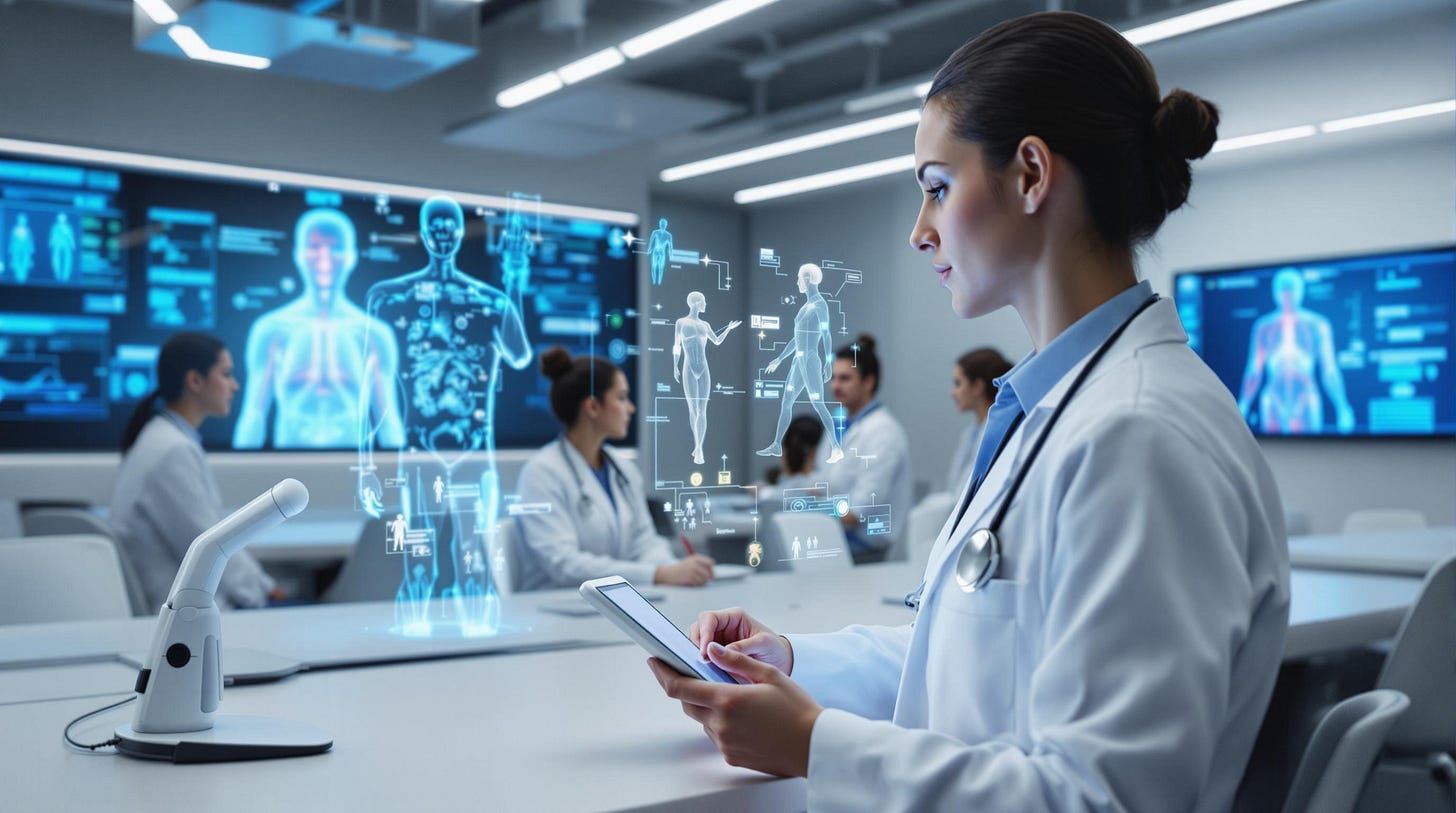In the quiet corridors of hospitals and the bustling chaos of emergency rooms, a silent revolution is taking place. Artificial intelligence (AI), once the stuff of science fiction, is now reshaping the very fabric of medicine. From diagnosing complex diseases to counseling families in moments of profound vulnerability, AI is proving to be not just a tool, but a partner in care. The question is no longer whether AI belongs in medicine, but how we can harness its potential while preserving the humanity at the heart of healing.
In this post, we’re going to journey on some thoughts from a New England Journal of Medicine publication - The AI Revolution in Medicine: Understanding How AI Can Advance Patient Care.
The article was shared on a WhatsApp group by Dr. Hwang who is colleague from the MIT course Designing and Building AI Products and Services. The article was especially compelling as these past few months have presented the need to navigate a difficult journey of supporting a loved one facing the uncertain outcome of an experimental cancer treatment. In times of emotional distress, it immediately became apparent how invaluable an AI assistant is - capable of sifting through extensive notes and complex terminology offering a much-needed sense of relief.
The AI Revolution in Medical Training
The world of medical training is undergoing a seismic shift, driven by the rise of large language models (LLMs). These advanced AI systems, capable of understanding and generating human language with remarkable fluency, are poised to redefine how doctors learn, are assessed, and ultimately practice medicine. The implications are profound—not just for the next generation of physicians, but for the patients they will serve.
Imagine a medical resident, exhausted after hours of study, struggling to absorb the vast knowledge required to become a competent physician. Now, picture that same resident collaborating with an AI system that can answer complex medical questions, simulate realistic patient encounters, and provide personalized feedback. This is not a distant dream—it’s the emerging reality of medical education, powered by LLMs like GPT-4.
The Rise of LLMs in Medicine: A New Era of Learning
At their core, LLMs are sophisticated AI systems trained on vast amounts of text data. They can analyze complex information, summarize research, and even simulate human-like conversations. In medicine, their potential is transformative. These systems are not just tools for answering questions—they are becoming partners in learning, offering personalized education, realistic simulations, and automated feedback.
Personalized Learning: Tailoring Education to the Individual
Every medical student learns differently, with unique strengths and weaknesses. LLMs can analyze a student’s performance, identify knowledge gaps, and provide tailored resources. Imagine an AI recommending specific textbook chapters, generating customized practice questions, or offering detailed explanations based on a student’s needs. This level of personalization could revolutionize how medical students retain knowledge and develop skills.
Virtual Patient Simulations: Bridging Theory and Practice
Traditionally, medical students have relied on textbooks and lectures to build their knowledge base. But bridging the gap between theory and real-world application is critical. LLMs can power interactive virtual patient simulations, allowing students to practice taking patient histories, conducting virtual exams, ordering tests, and making diagnoses. These simulations create a safe, controlled environment where students can refine their clinical reasoning and communication skills without the pressure of real-world consequences. For example, a student might interact with a virtual patient presenting with chest pain. The AI-powered simulation could respond to questions, provide relevant medical details, and even simulate emotional responses. This dynamic interaction brings textbook knowledge to life, preparing students for the complexities of real-world patient care.
Automated Feedback and Evaluation: Empowering Growth
Timely feedback is essential for medical students to improve, but providing personalized feedback to large cohorts is a challenge for faculty. LLMs can step in, offering automated evaluations of written assignments, analyzing performance in simulations, and identifying areas for improvement. By streamlining these tasks, LLMs free up faculty to focus on mentoring and guiding students, enhancing the overall learning experience.
LLMs and Physician Competency: A New Benchmark?
The potential of LLMs extends beyond education—they could redefine how we assess physician competency. A groundbreaking study published in NEJM AI compared the performance of GPT-3.5 and GPT-4 to resident physicians taking medical board exams in Israel. The results were striking: GPT-4 demonstrated physician-level performance across multiple specialties, even outperforming many human physicians in psychiatry and internal medicine. This raises intriguing possibilities.
Could LLMs help establish clear benchmarks for physician competency?
Could they create adaptive assessments that go beyond multiple-choice questions, testing clinical reasoning and decision-making in realistic scenarios?
While these ideas are exciting, they also demand careful consideration of ethical implications and the role of human oversight.
Beyond Knowledge: Can AI Teach Empathy?
One of the most compelling—and controversial—questions is whether AI can help physicians develop empathy. A thought-provoking perspective piece, "Who’s Training Whom?", recounts a physician’s experience using ChatGPT to simulate emotionally charged patient encounters.
To his surprise, the AI provided compassionate and insightful responses, even surpassing his own performance in some cases. This raises an intriguing possibility:
Could AI systems help physicians become more empathetic communicators?
By practicing difficult conversations with an AI, physicians can experiment with different approaches and receive immediate feedback. This kind of training could help them explain complex medical information more clearly, address patients’ emotional concerns with sensitivity, and navigate ethical dilemmas with greater confidence.
Far from replacing the human touch, AI could enhance it.
Challenges on the Road Ahead
While the potential of LLMs is immense, their integration into medical training comes with significant challenges. Thoughtful and responsible implementation will be key to ensuring that these systems enhance education without compromising ethical principles or patient safety.
Accuracy and Bias LLMs learn from the data they are trained on, which means they can inherit biases or inaccuracies. In healthcare, this is particularly concerning, as biased or inaccurate information could perpetuate health disparities. Ensuring that LLMs are trained on diverse, representative, and rigorously vetted data is essential.
Ethical Implications The use of LLMs raises complex ethical questions.
How do we ensure data privacy when these systems require access to large datasets?
How do we maintain transparency and accountability in their assessments?
And how do we prevent misuse, such as cheating on exams or over-reliance on AI for clinical decisions? Clear guidelines and proactive oversight are critical.
Integration into Existing Curricula The enthusiasm for LLMs should not overshadow the importance of traditional teaching methods, such as hands-on clinical experiences and mentorship.
The key is to integrate LLMs thoughtfully, using them to complement and enhance existing approaches. For example, LLMs could supplement lectures with interactive case studies or provide personalized feedback on simulations.
A Future of Synergy, Not Replacement
The goal of AI in medicine is not to replace human physicians but to augment their capabilities. LLMs can serve as intelligent assistants, providing rapid access to medical research, automating administrative tasks, and freeing up time for physicians to focus on patient care.
This synergy between human expertise and AI has the potential to create a more empathetic, efficient, and equitable healthcare system. The journey ahead will require collaboration among educators, clinicians, AI experts, and ethicists. By embracing AI as a tool for learning and growth, we can move toward a future where technology empowers the human connection at the heart of medicine.







